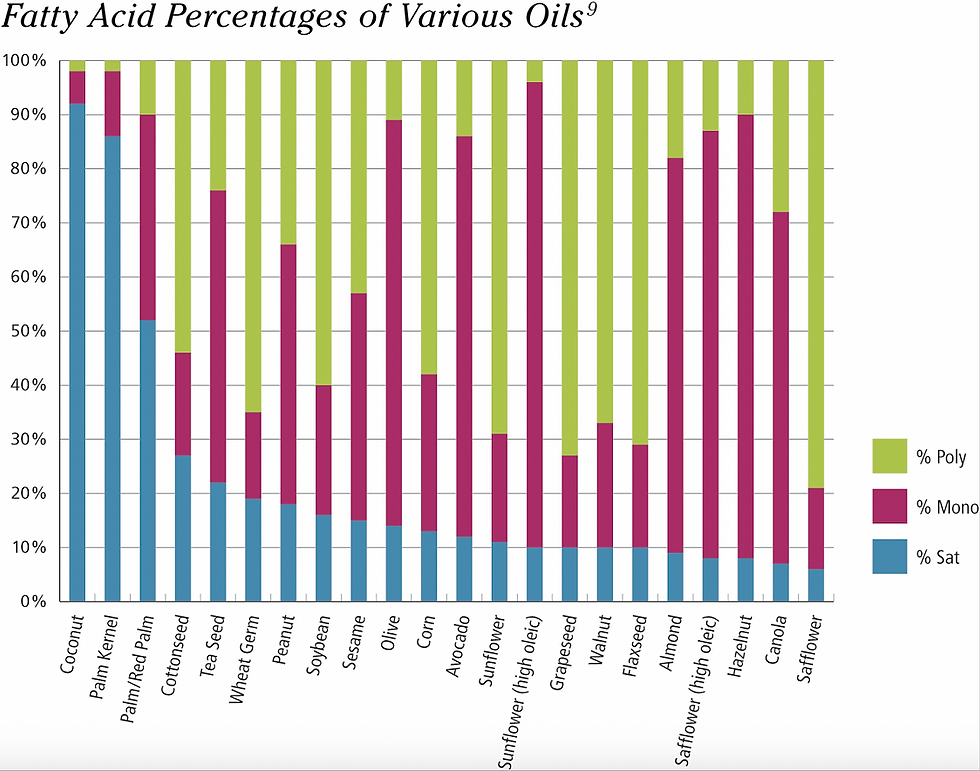
Fatty Acid % of Oils
And why it's important
Does the type of oil used in cooking matter? Yes!!! And here's why...
This chart breaks down the amount of polyunsatruated, monounsaturated, and saturated fats in various different types of oils. The green represents polyunsaturated fat. The dark pink represents monounsaturated fat, and the blue represents saturated fat. The types of fats in these oil products varies greatly and it's an important thing to understand.
Saturated fats are typically solid at room temperature. They are found in animal products and some plants including coconut, coconut oil, palm oil, and palm kernel oil. Saturated fats contribute to high cholesterol and heart disease, and it's generally a good idea to limit the intake of them.
Unsaturated fats are liquid at room temperature and are beneficial because they can decrease inflammation, improve cholesterol, and stabilize heart rhythms. There are two types of unsaturated fats, they include monounsaturated and polyunsaturated.
Monounsaturated fats are also known as Omega-7 and 9. They are found in plant foods such as nuts, avocados, and vegetable oils. They may help with weight loss, improve insulin sensitivity, decrease risk of cancer and heart disease, and decrease inflammation.
Polyunsaturated fats consist of Omega-3 and Omega-6 fatty acids. They are found in fish, plant oils, and some nuts and seeds. They are essential fatty acids meaning that the body cannot make them and therefore they must be obtained from the diet.
Omega-3 fatty acids are what's found in fish, fish oil supplements, and flax seed etc.. The three types of omega-3s are DHA, EPA and ALA. These can help reduce triglycerides, lower blood pressure, decrease risk of plaque buildup, and decrease inflammation in the body.
Omega-6 is also known as Arachidonic Acid, is a polyunsaturated fat, and can be pro-inflammatory in nature. The Standard American Diet (SAD) is quite plentiful in omega-6 fatty acids. The fact that they may be pro-inflammatory does not mean that they're unhealthy, getting some omega-6 is quite important for health. At a healthy level, omega-6s can help to control blood sugar, decrease risks associated with diabetes, and help lower blood pressure.
Scientific data suggests that using less saturated fat, and replacing that saturated fat with mono or poly-unsaturated fats can promote overall health. Coconut oil, while great, is made up of a high amount of saturated fat. Does this mean it's bad to consume? No, however it is wise to not make it the primary source of cooking oil used in the diet.
Instead, go for oils that are liquid at room temperature and contain higher amounts of mono and poly unsaturated fats.
A good rule of thumb for macros is for the fat content to make up 25-30% of calories consumed, and the saturated fat no more than 10%. If someone has existing heart disease, the saturated fat contribution should be even less, going for 7% or less of your calories consumed.
What does this look like? For someone consuming 2000 calories per day:
Saturated fat intake: no more than 22 grams per day (or no more than 15 grams per day for an existing heart condition). The 22 grams could look like: 1 tbsp of butter (7g) + 1 tbsp of coconut oil (12g) + 3 oz red meat (2g) = 21g. Just to put it into perspective, this would mean that the rest of this person's protein for the day would come from plant-based proteins (because they have little to no saturated fat). In addition, they'd need to watch how they cook additional foods, ensuring not add any additional saturated fat for the day.
Mono and polyunsaturated fats: ~44 grams per day
Bottom line: choose cooking oils that are solid at room temperature more often than not. Try to consume less saturated fat and more poly and monounsaturated fats from plant, nuts, avocados, seeds, and fish!
